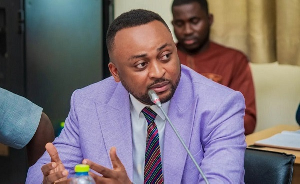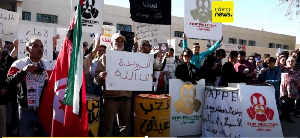Some ideas are virulent and none so more than that which say you can takeover a country by the force of arms and rule it through violence and intimidation. Hopefully, Ghana as a society came to this realization with the election of President J. A. Kufuor in 2000.
The election next week brings another opportunity to reaffirm what was learned in 2000. These are crucial times for the whole region of West Africa. Particularly, with the Ivory Coast restless and politically unstable, it is vital that Ghana makes the right decision for the next four years.
A vote for President Kufuor, it seems, is the right decision. He has operated a very democratic government. The next four years of his administration will allow preference for civilian rule to sink into the national consciousness. And that it is best if free people are allowed to choose their government through the ballot process.
As of now, there are only two viable candidates among many contesting for the presidency. These two represent the most popular political parties in Ghana, the NPP and the NDC. One of them, most likely, will form the next government.
By all indications leading to the polls, it is the NPP that will form the next government - and justifiably so. More so because of the leadership President Kufuor has provided. He has led the country successfully through what could have been a perilous four years period for the nation.
Against President Kufuor is Prof. Atta Mills, the former vice-president of the last administration and presidential nominee of the NDC for 2004.
There are other worthy candidates in the race for 2004, but the parties they represent have lesser chance of propelling them to victory. These parties are either weak or fragmented; therefore have little prospect of forming the next government.
The CPP readily comes to mind. This is a party that is imbued with a tradition that can turn it into a formidable party. As of now, its party machinery is divided, dysfunctional and its leaders and exponents of party ideals are for now sharply at odds.
The NPP and the NDC have their machinery and political ideals intact. The ideals of these two parties therefore should frame the debate for the coming elections.
To be sure, when asked, each party would claim its ideals and policies are the best for the country, and therefore is entitled to rule.
The NDC and its parent organization (PNDC) ruled Ghana for 19 years. It should be recalled that the PNDC came to power by a coup; unelected and uninvited. In the latter years of its administration, the PNDC morphed into a civilian government with the name NDC.
Some may claim the NDC as a value shift for the PNDC; but the claim can?t be much with Rawlings still in control of the party. With him in charge, it is hard to perceive the NDC as anything less than a party that violence wrought.
Rawlings, the ex-president and founder of the NDC, in speech after speech, has not allowed the nation to forget that the NDC is a party that was fashioned by bullet power. He is seeking actively to bring this party to power for the next term.
In Rawlings? speeches, it is somewhat amusing to hear him declare that he has no intention to rule Ghana again. His reasoning is that he has ruled the country for 19 years ?therefore has no desire or intention to return to power at all.?
But the question to Rawlings is does he understand why the NDC must also not be returned to power? He is the reason why. His presence makes the NDC politically vulnerable and its candidates for office very suspect.
There are many members of the NDC today whose aims for the country are altruistic, and who on their own could be excellent candidates, but they cannot deny that their party came to power through violence. And it is this attachment to the tradition of violence that makes them vulnerable.
It is this culture of violence that must not be encouraged or sustained because it represents danger not only to Ghana but to the entire region.
Rawlings? very presence on the sideline and his vocal salvos in the electioneering process are reminders of this violence. His behavior has helped to raise doubts about his true intentions. Many think that Prof. Atta Mills, the apparent flag bearer of the NDC , is only a titular head and a stalking horse for Rawlings.
There is the speculation out there that Rawlings has an unfulfilled ambition, and will do his best to see this through, even if it meant going through Mills.
This may be speculation only. But one risks danger to presume Rawlings purposeless, or ambitionless, or a man without the tenacity to achieve his objective, including imposing his will on the people of Ghana again.
Those who doubt Rawlings? tenacity have only to consider his will to power both in 1979 and 1981.
Since 2000, he has tried in various ways to impose his will on Kufuor. He has strived to intimidate the current president through bragging and threats. He has on several occasions turned protocol on its head. Every message he has uttered since 2000 was about getting his wishes fulfilled, in spite of the fact that it wasn?t the NDC that brought Kufuor to power.
If Rawlings did all this to Kufuor imagine how malleable Atta Mills will be to his wiles should the NDC be returned to power!
President Kufuor, unlike Rawlings, represents a peaceful transformation of power. His subsequent acts as president have been encouraging and on track as those of government by the rule of law. In spite of Rawlings abuses of protocol, Kufuor has kept a respectable relationship with him.
In four years of rule, President Kufuor has corrected the course of Ghana?s economy. The rapid rise of inflation has been slowed. He is tackling issues on education and health at a rapid pace. He has proven himself the best sales person for Ghana with numerous trips abroad to promote industry.
In Africa, he has shown himself as a good example of the new leadership that the continent needs. He is an advocate for peace in the region. His current interest and participation in the Ivory Coast peace process is very encouraging. His administration is also the first in Africa to undergo the peer review process under the auspices of NEPAD.
In all, life in Ghana is on the mend. The pride of place which Ghana once attained among the nations of Africa seems to have returned. Yet, there is still more ahead: More to be done to make this once magnificent nation a joyful and a safe place to dwell.
That is why it is crucial to return Kufuor to power so that the nation can, through a peaceful process, maintain the stability it has achieved, and continue to serve as a beacon of hope for nations in the region.
E. Ablorh-Odjidja, Washington, DC November 28, 2004
Opinions of Monday, 6 December 2004
Columnist: Ablorh-Odjidja, E.












